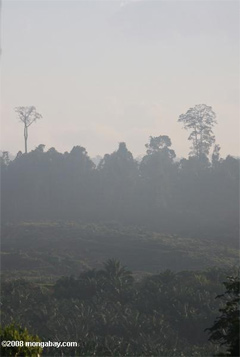Sarawak to continue logging forests for oil palm plantations
mongabay.com
June 30, 2008
Despite a prime minister’s directive banning conversion of forest reserves for oil palm plantations, the Malaysian state of Sarawak will continue to open up forest land for oil palm plantations, reports the New Straits Times.
Speaking to the press Saturday, Chief Minister Tan Sri Abdul Taib Mahmud said that the move will not go against the prime minister’s directive because “it did not apply to the state,” according to New Straits Times. Taib said the land targeted for new plantations “were not permanent forest reserves but land targeted for agriculture since the 1950s.”
He added that orangutans were “safe” in the state due to the establishment of a sanctuary. He said the state had also set up a 30,000 hectare (75,000 acre) reservation for the Penan and other indigenous nomadic tribes that live in the rainforest.

Oil palm plantation and forest in Malaysian Borneo.
|
“There are no reasons for us not to continue opening up more land,” he said.
Taib’s comments shortly after a month-long protest by the indigenous Kenyah over illegal logging on their communal lands. The blockade of logging roads was broken up by Malaysian police earlier this month.
Researchers say that growth of the Malaysian palm oil industry has come partly at the expense of natural forests. A study published in the journal Conservation Letters showed that 55-59 percent of oil palm expansion in Malaysia between 1990 and 2005 occurred on forest land. Environmentalists say the loss of forests threatens biodiversity and has diminished important ecosystem services including water regulation and carbon storage. The palm oil industry has responded by noting that palm oil is used mostly in food products — not for biofuels — and has a higher yield than other oil crops, including soy and rapeseed. The industry says that palm oil has been a driver of rural development in Malaysia and that much of the forest converted for oil palm had previously been logged or zoned for agriculture.







